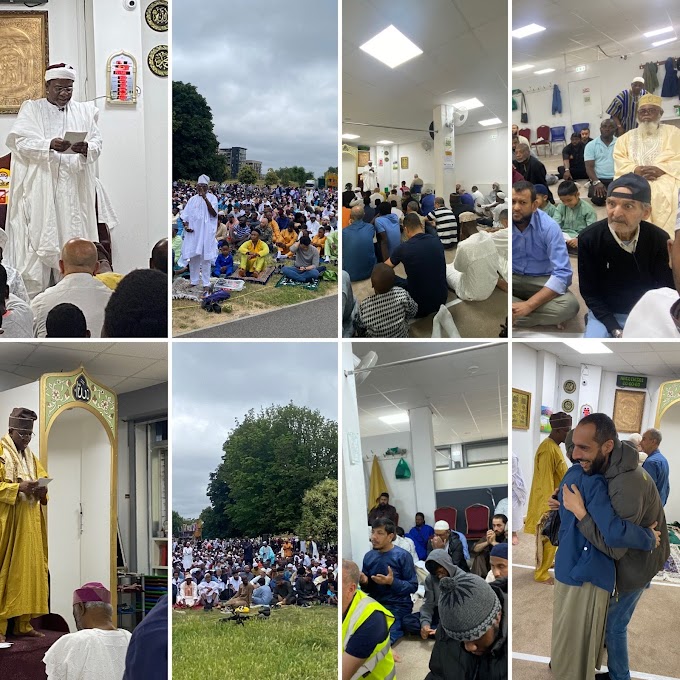The Social significance of Hajj was explored by Professor Mashood Baderin who led the Jum’ah prayer at the Old Kent Road Mosque and Islamic Cultural Centre, London. It was the second part of his talk to mark the month of holy pilgrimage.
The Imam explained that apart from being a corpus of rites, Islam is a social religion; this is seen in the many acts of worship that promote congregation above individualism. The Imam drew examples from the five daily obligatory Solat that is rewarded but the worshipper gains more rewards if observed in Jamah or congregation. Likewise, Solat is good at the local or ‘Ratibi’ Mosques but the believers are enjoined to seek manifold rewards from their Friday prayers at a larger Jum’ah /central mosques. He explained that the need to avoid eating fresh onions or garlic, taking fresh bath and applying sweet smelling perfume is also as a consideration for others at the mosque who would have felt offended by foul smells from an unkempt body.
Citing Suratul Hajj Q.22: 27-29. the Imam explained that the call of Ibrahim (ASWS) to mankind for the holy pilgrimage came with both spiritual and social benefits. He noted that looking back at the time when there was no social media, yet in fulfillment of Allah’s promise, the call reached all the corners of the world, hence the global attendance recorded in Hajj, the arid location notwithstanding.
Q. 22: 27. *And proclaim unto mankind the pilgrimage. They will come unto thee on foot and on every lean camel; they will come from every deep ravine,*
(22: 28) *That they may witness things that are of benefit to them, and mention the name of Allah on appointed days over the beast of cattle that He hath bestowed upon them. Then eat thereof and feed therewith the poor unfortunate*.
(22:29) *Then let them make an end of their unkemptness and pay their vows and go around the ancient House.*
The Imam quoted the great scholar Ibn Abbass, who explained the social implications of eating the sacrificed animals, sharing amongst brethren , trading and ultimately earning the Pleasure of Allah as some of the benefits of Hajj in both worlds.
Professor Baderin spoke on the limitless but grossly lost social and political opportunities that the annual convergence of believers would have given the muslim world. He highlighted Hajj as the ultimate platform for muslim heads of state to meet in a spiritually charged, less political environment to promote world peace.
It is one of the teachings of Islam to be socially trained. When a believer comes to a group, he or she is taught be accommodating, create space for others, sacrifice, show selflessness and shun greed. Pilgrims were warned not to cause harm, engage in wrangling or arguments.
Professor Baderin shared findings from a Malaysian research that the “Habit of Patience and Resilience stay with those who had performed hajj for long time after their return home” to show the social reformative impact of Hajj.
He added that global muslim brotherhood is strengthened by Hajj, which breaks barriers, spreads love, promotes trade and expands the room for consultation in the pursuit of global unity.
He noted that sacrificed animals which used to go to waste is now channelled to create wealth and fulfil social responsibility. Such animals are flash frozen and sent across the world to feed others.
In the second part of the Khutbah, the Imam recounted how in the past hajj time was considered strictly for spiritual acts until Allah revealed that there is no sin on believers to transact during Hajj as long as it is halal and such transactions are not the sole purpose of going on Hajj.
The sayings of Prophet Muhammad (saws) was that the reward of Umrah after Umrah or an acceptable Hajj is absolute forgiveness of all sins, was quoted to motivate the congregation.
Professor Baderin urged intending pilgrims to be prepared; be on top of their physical fitness, take care of their medication, conserve their wealth etc but always bear in mind that the best of preparation is Taqwah; the loving fear of and consequently obedience to Allah.
His closing remark to those who are yet to perform the holy pilgrimage was “Hajj is beautiful, it’s a life-long experience “
Professor Mashood Baderin made Du’a for all pilgrims , would-be pilgrims and the world at large.
(Hassan O. G/ June 23, London)








